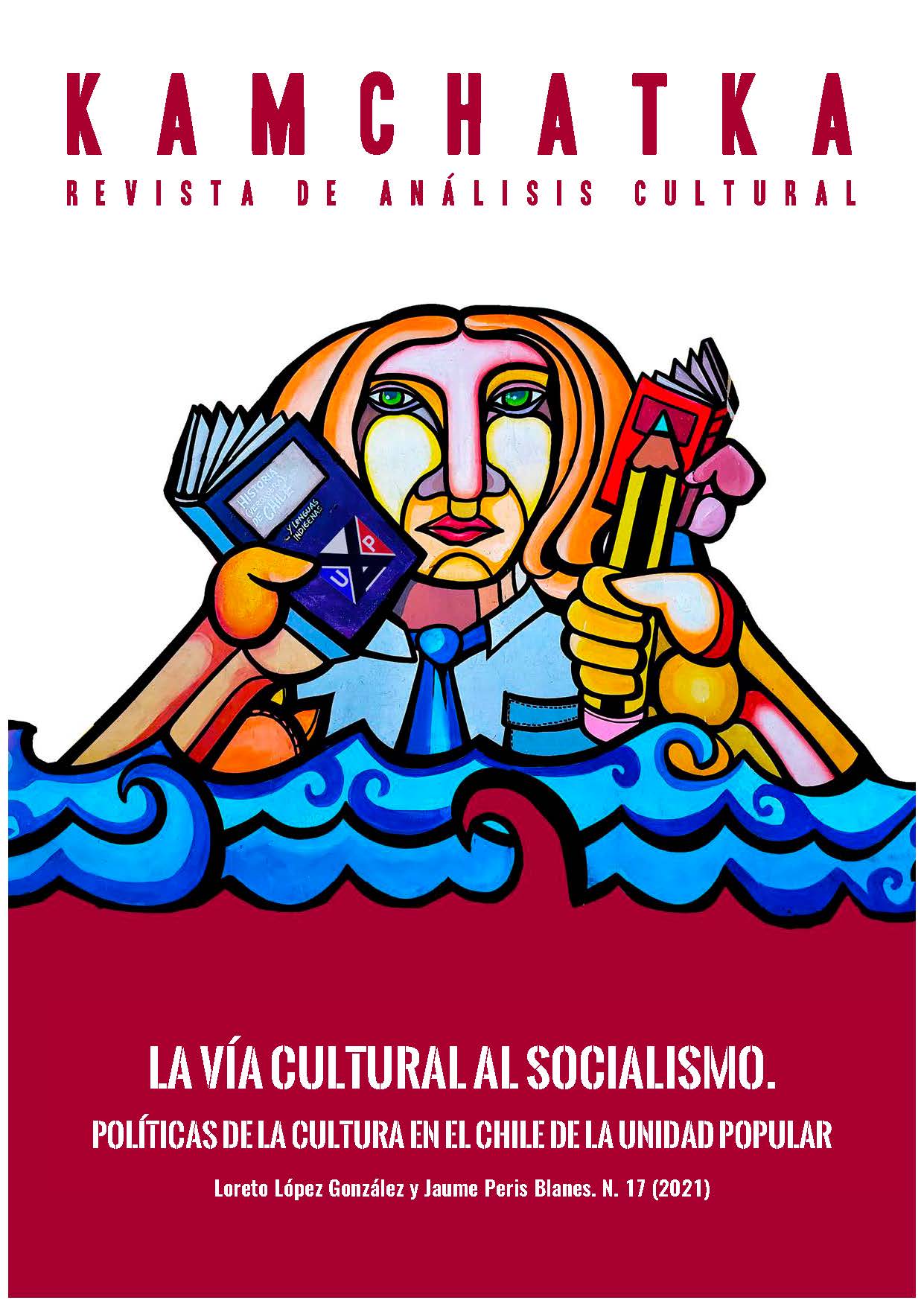People`s Train of Culture: expression of art for all
DOI:
https://doi.org/10.7203/KAM.17.17792Keywords:
Chile, People`s Train of Culture, Chilean New Song movement, Popular Unity Abstract
Abstract
Measure number 40 of the Popular Unity government program headed by President Salvador Allende, had the objective of creating the National Institute of Art and Culture through the establishment of artistic training schools in all the provinces of Chile. The flagship experience that managed to unite all the symbolism after this measure was the People´s Train of Culture, a train that traveled with artists from various disciplines for forty days to the south of Chile, taking various artistic expressions to places where they had never arrived before. The activity carried out in February 1971 was successful in terms of the artists who participated in it and the population
benefiting from the activities, however, it was never repeated again, due to events that made it difficult for the Unity government to continue Popular, to the point of causing its fall in the coup d’état of September 11, 1973. What was left of that experience in the Chilean population? Can it be considered one of the first attempts to decentralize the culture of the capital and promote young artists from their closest geographical and cultural environment? Did the experience leave its mark on the artists who later had to fight against the dictatorship from within or from exile? It is what we try to decipher in this article. This is what we are trying to decipher in this article, which is complemented by testimonies captured in the recording process of the documentary "People´s Train of Culture", directed by the author in 2015.
 Downloads
Downloads
 References
References
ALBORNOZ, César en PINTO, Julio (Ed.) (2005) Cuando hicimos historia: la experiencia de la Unidad Popular, Santiago de Chile: LOM.
BOWEN, Martín (2008). El proyecto sociocultural de la izquierda chilena durante la Unidad Popular. Crítica, verdad e inmunología política, Nuevo Mundo Mundos Nuevos. https://doi.org/10.4000/nuevomundo.13732
DÁVALOS, Eulogio (2017). Una leyenda hecha guitarra. Madrid: Ediciones B.
EBON, Martin (1987). The Soviet Propaganda Machine. Nueva York: McGraw-Hill.
ESPINOZA, Carolina (2015). El tren popular de la cultura. España: Sociedad Sonora Producciones.
GARCÍA ALONSO María (2021). La extensión pedagógica en Iberoamérica como modelo de acción política: las misiones educativas laicas, Revista Historia Caribe, Vol. 15 Núm. 38: enero-junio (en prensa).
GARCÍA ALONSO, María (2008). La emoción de la cultura. El uso político de la emoción como transformadora de espacios culturales. En Territorio e Cultura. Inclusao e exclusao nas dinamicas socioespaciais, coordinado por Geralda de Almeida y Beatriz Nates Cruz. Goiania y Manizales: Universidade Federal de Goias / Universidad de Caldas, 55-63.
GODOY, Francisco (2010). Con el chileno resistente arte, Solidaridad: Chile Vive, una Exposición en España contra el Chile Dictatorial en revista Aisthesis No 48, Instituto de Estética - Pontificia Universidad Católica de Chile,186-204.
MARÍN, Germán (1972). Elitismo o Populismo: falsa alternativa, Chile, hoy, año 1, N°7: 19.
MEDINA, Pablo (2016) Apuntes para una historia de las Misiones Pedagógicas en Argentina. En Cine educativo y científico en España, Argentina y Uruguay, editado por Alicia Alted y Susana Sel. Madrid: Ramón Areces, 76-88.
PANIZZA, Tiziana (2011). Joris Ivens en Chile: el documental entre la poesía y la crítica, Santiago de Chile: Cuarto Propio.
RODRÍGUEZ, Javier (2017). El folklore como agente político: la Nueva Canción Chilena y la diplomacia musical (1970-1973), Nuevo Mundo Mundos Nuevos. DOI : https://doi.org/10.4000/nuevomundo.70611
ROLLE, Claudio (2014). La Nueva Canción Chilena. El proyecto cultural popular y la campaña presidencial y gobierno de Salvador Allende, archivado el 3 de agosto de 2014 en la Wayback Machine. http://pensamientocritico.imd.cl/
VASCONI, Tomás (1971). Dependencia y Superestructura, Modernización y crisis en la Universidad Latinoamericana, Cuadernos de Estudios Socioeconómicos N°14, Santiago, Centro de Estudios Socioeconómicos de la Universidad de Chile.
VIDAL, Virginia (1971). Revista En Viaje, Nº 448, 02 :11-12.
VV.AA. (1969). Programa Básico de Gobierno de la Unidad Popular. Candidatura presidencial de Salvador Allende, Santiago de Chile: 50.
Downloads
Published
How to Cite
-
Abstract1156
-
Artículo PDF (Español)664
Issue
Section
License
This journal provides an immediate free access to the content on the principle that freely make investigation available to the public, which promotes an increased global knowledge exchange.
Unless otherwise indicated, texts published in this journal are under the license Attribution-NonComercial 4.0 by Creative Commons. These texts may be copied, distributed and publicly communicated whenever the publication’s author and title are quoted and whenever they are not used for commercial purposes. In any case, intellectual property of the articles and its potential economic rights entirely belong to its authors.
The full license can be consulted on https://creativecommons.org/licenses/by-nc/4.0/. We encourage authors to disseminate papers published in Kamchatka. Journal of cultural analysis electronically, in institutional digital repository or in their websites.





